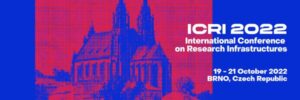Pre-conference events for the 2022 joint conference of the African Light Source and the African Physical Society start this week as part of the International Conference on Research Infrastructures (ICRI).
Free registration for these sessions will also register you for the 2022 Joint Conference of the African Light Source and African Physical Society. After you register you will received the Zoom information.
African Light Source and African Physical Society ICRI Sessions
Problems and Solutions in Commercial Law and Political Economics for Multinational Big Science Projects
Monday, October 17, 2022 10:00 – 12:00 GMT+2
Big science projects, e.g., astronomy observatories, advanced lightsources, CERN and ITER, invariably involve many nations in a real resource-contributing way. That is, the project’s budget will have multiple revenue sources, each with its own expectations for accountability to parliaments and taxpayers.
Thus, big science is a key frontier in economic harmonization and integration, and one of the key pillars of science diplomacy, as both beneficiary and driver or broader diplomacy efforts.
One key question regarding Big Science and social justice is how do South and developing nations in general get included, and how do they contribute to international law and policy without being run roughshod over. These questions can be embedded into broader questions about global economic inclusion, equity, justice, and development.
In this session we will explore advantageous economic and legal policies for multi-national Big Science projects involving North-South and South-South multi-national collaborations.
We will also discuss everything from Pan African commercial law, i.e., patents, customs, mobility of materials and persons, to fiscal policies relevant to the STI and higher ed sectors as well as the general notion of economic, legal, and political harmonization.
We hope to build and appreciation of some of the principles of policy and law making amongst scientists that drive big science projects.
Regional Facilities on the Roadmap Towards a Pan African Synchrotron Light Source Facility
Monday, October 17, 2022 14:00 – 16:00 GMT+2
Advanced light sources based at either large-scale synchrotron or free electron laser facilities are currently the most transformative research infrastructures for application to a broad spectrum of disciplines. They embrace crystallography, essentially all spectroscopy, scattering and imaging techniques, utilizing radiation from the infrared (IR), to the visible, ultraviolet (UV), X-ray, and even to the soft gamma ray portion of the electromagnetic spectrum, and support the highest density of researchers from the widest range of disciplines.
Though costly, advanced light sources have become clear leaders for research outputs, graduate student training, and drivers of technological innovation. Thus, they benefit nations far more than they cost.
Africa is presently the only habitable continent without a LS. Dozens of scientists from African countries now perform experiments at facilities in Europe and elsewhere. Their numbers are limited mostly by distance and travel costs. An advanced light source in Africa would enable thousands of African scientists, engineers and students to gain access to this superb scientific and technological tool. Indeed, in order to be competitive socially, politically and economically in the years to come, access to a nearby LS will be an absolute necessity.
While large-scale synchrotron or free electron laser facilities can cost on the scale of $10^8-10^9 USD, so-called compact light source (CLS) facilities cost on scale of $10^7 USD, and are on the size scale that can be accommodated in a normal university campus building. Technological advances are leading to machines that that have suitable photon flux density to produce credible research results. Thus, compact light sources, along with cryogenic electron microscopes (cryoEM), are attractive options for a single university and national government, or group of universities governments in which to invest.
In addition to yielding credible research results, a campus-based compact light source can be an important training platform, and concept-testing platform for follow-on studies at large-scale facilities like the European Synchrotron Radiation Facility, or what the African Light Source Foundation has planned as a Pan African Synchrotron Light Source Facility.
Thus, we say CLS and cryoEM machines are important elements on the roadmap towards a Pan African Light Source.
Research Libraries, Access to Journals and Data as Critical Research Infrastructure
Tuesday, October 18, 2022 10:00 – 12:00 GMT+2
Research libraries, access to research information (journals and data) are critical research infrastructures. Many researchers in developing countries do not have adequate access to engage in globally competitive research. In this session we will explore the scope of the problem and explore plausible solutions with publishers, librarians, and policy makers.
Are MOOCs and Virtual Universities Now Requisite Parts of Research Infrastructure?
Tuesday, October 18, 2022 14:00 – 16:00 GMT+2
The global COVID pandemic globally transformed massively online courses (MOOCs) into absolute necessities. Indeed, MOOCs are transforming human capacity building for research infrastructures. In this session we will explore how this is manifesting in Africa.
MOOCs are important research training platforms, and rests upon IT infrastructure, itself a critical research infrastructure. Making MOOCs adds a new dimension to education praxis, requiring a whole new set of teaching skills. This session will explore the infrastructures and skills necessary to successfully deliver, and for students to take a MOOC.
